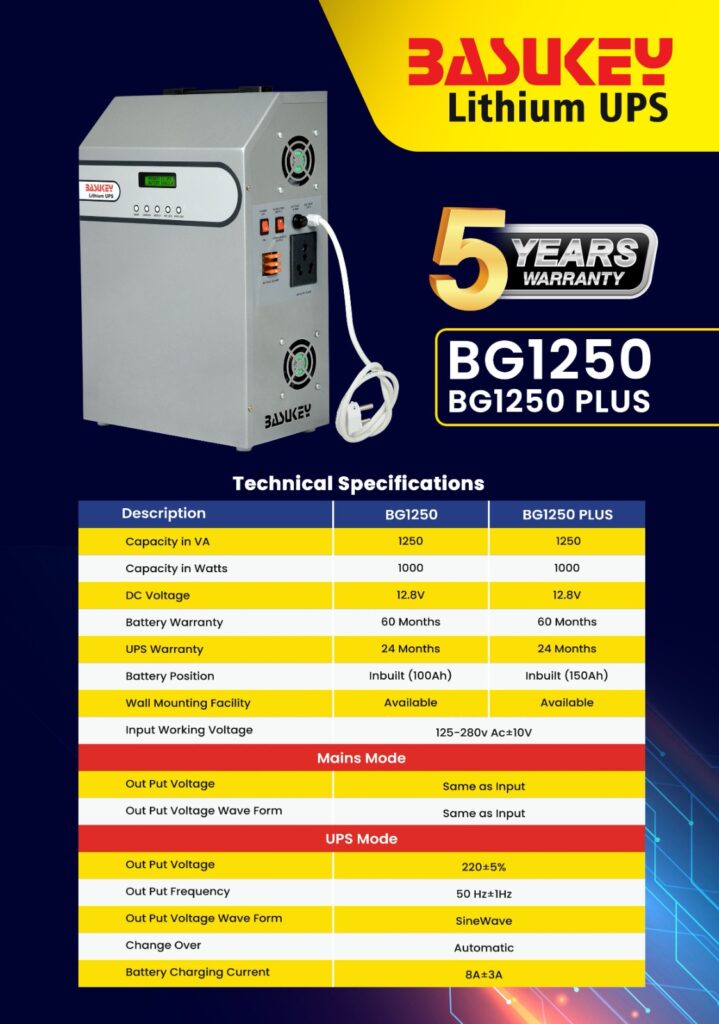The Smart Power Backup Strategy: Choosing the Right UPS Battery
The Smart Power Backup Strategy: Choosing the Right UPS Battery. Power disruptions can severely impact businesses and homes, leading to downtime, data loss, and operational inefficiencies. Selecting the right Uninterruptible Power Supply (UPS) battery is essential for ensuring continuous power availability and system protection. Basukey Lithium UPS offers an advanced power backup solution designed for high efficiency, long lifespan, and seamless power continuity. This guide explores the key factors in choosing the right UPS battery and why Basukey Lithium UPS stands out as a strategic power backup investment.
Key Considerations for Choosing a UPS Battery
1. Battery Type and Performance
The type of battery used in a UPS determines its efficiency, lifespan, and maintenance requirements.
| Feature | Lead-Acid UPS | Basukey Lithium UPS |
|---|---|---|
| Lifespan | 3–5 years | 10–15 years |
| Charge Time | 8–12 hours | 2–4 hours |
| Efficiency | 70%–80% | 95%+ |
| Maintenance | High | Low |
| Weight & Size | Heavy & bulky | Compact & lightweight |
Basukey Lithium UPS provides higher energy density, faster recharge rates, and longer operational life, making it the preferred choice for businesses and critical applications.

2. Load Capacity and Power Requirements
To choose the right UPS, determine the total power consumption of connected devices. Consider factors such as:
- Wattage of critical equipment (servers, networking devices, medical systems)
- Backup duration required (short-term power bridging vs. extended backup)
- Scalability needs for future power expansions
Basukey Lithium UPS solutions are modular and customizable, ensuring optimal performance for varying load capacities.
3. Battery Runtime and Recharge Efficiency
A UPS must supply adequate power during an outage and recharge quickly for subsequent power events. Basukey Lithium UPS systems feature:
- Faster charging cycles, reducing downtime between discharges
- Higher depth of discharge (DoD) without affecting battery longevity
- Smart energy management, optimizing power consumption based on load demand
4. Safety and Reliability
Safety is a critical factor when selecting a UPS battery. Basukey Lithium UPS includes:
- Advanced Battery Management System (BMS) for real-time monitoring
- Overvoltage, temperature, and short-circuit protection
- Stable performance in extreme conditions, ensuring uninterrupted power supply
5. Sustainability and Cost Savings
A reliable UPS should not only protect systems but also contribute to long-term cost savings and environmental sustainability. Basukey Lithium UPS offers:
- Lower total cost of ownership (TCO) by reducing replacement and maintenance costs
- Higher efficiency, leading to reduced energy consumption
- Eco-friendly lithium battery chemistry, minimizing environmental impact
Why Basukey Lithium UPS is the Smart Backup Choice
1. Instant Power Backup
Basukey Lithium UPS ensures millisecond-level response times, preventing disruptions in critical operations such as data centers, financial services, healthcare, and manufacturing.
2. Smart Energy Management & Remote Monitoring
With AI-driven battery management, users can:
- Monitor UPS performance in real-time through digital interfaces
- Optimize battery usage to extend lifespan and reduce operational costs
- Receive predictive maintenance alerts to prevent unexpected failures
3. Scalable Solutions for Businesses & Homes
From small office setups to large-scale industrial applications, Basukey Lithium UPS offers modular, expandable power backup solutions tailored to diverse energy demands.
Conclusion: Future-Proof Your Power Backup Strategy
Choosing the right UPS battery is essential for ensuring business continuity, system protection, and cost efficiency. With Basukey Lithium UPS, businesses and homeowners gain a high-performance, long-lasting, and intelligent power backup solution that meets today’s energy demands while preparing for future challenges. By investing in Basukey Lithium UPS, organizations can implement a smart power backup strategy that maximizes efficiency, reliability, and sustainability.
